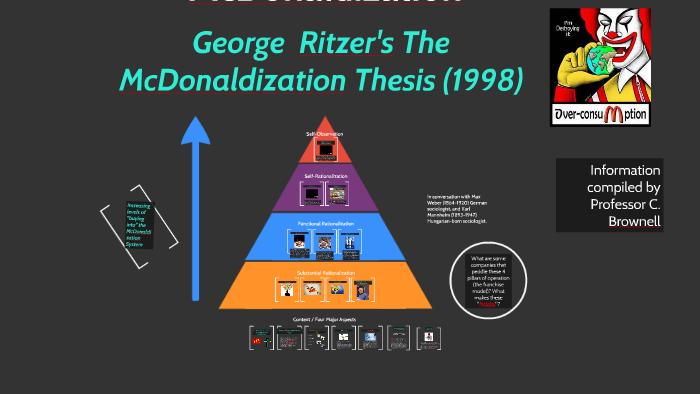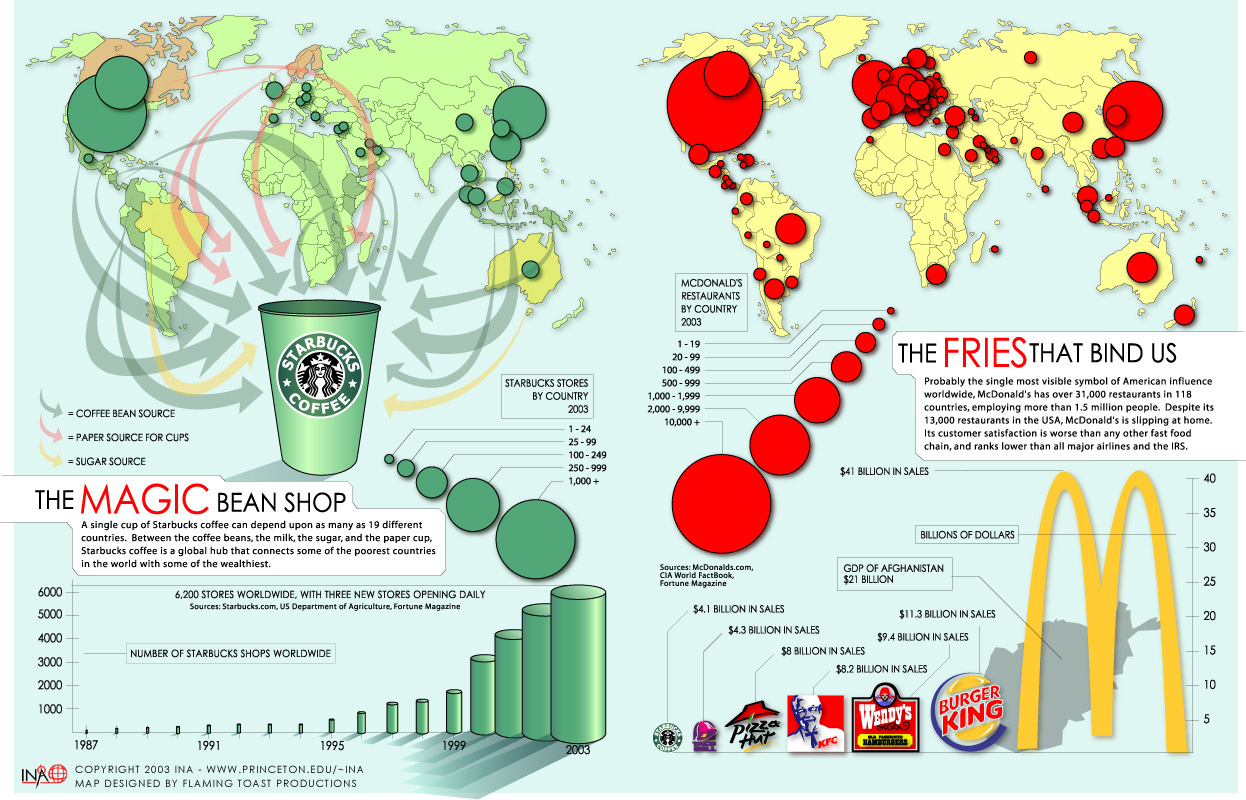Imagine stepping into a classroom, not filled with the buzzing of lively discussions and the sound of creative exploration, but with the quiet hum of standardized tests and the repetitive drone of a teacher meticulously following a scripted lesson plan. This scenario, while seemingly bleak, reflects a growing concern in the world of education: the creeping influence of “McDonaldization.”

Image: prezi.com
Coined by sociologist George Ritzer, McDonaldization refers to the process of applying the principles of fast-food restaurants, such as efficiency, predictability, calculability, and control, to other spheres of life. While the concept originally applied to the fast-food industry, its tentacles have extended to encompass various institutions, including schools. This article delves into the implications of McDonaldization on education, its potential benefits and drawbacks, and explores how this trend is shaping the future of learning.
Efficiency and Predictability: The Assembly Line of Learning
McDonaldization in education manifests itself most prominently through the emphasis on efficiency and predictability. Schools, striving to churn out students who are proficient in standardized tests, prioritize rote learning and standardized curricula. This focus on efficiency often eclipses the intrinsic value of learning, transforming classrooms into assembly lines where knowledge is delivered in bite-sized, digestible chunks. Standardized tests, designed to measure students’ performance against a predetermined set of benchmarks, become the primary measure of success, overshadowing the development of critical thinking, creativity, and individual passions.
Calculability: Quantifying Knowledge and Skills
The McDonaldization of education also extends to the realm of quantifiable metrics. Schools, driven by a need to demonstrate their “effectiveness,” place a strong emphasis on statistics and data. Student performance is meticulously tracked, analyzed, and compared, often resulting in an overemphasis on standardized test scores and other numerical measures. While data can provide valuable insights into the effectiveness of learning processes, the relentless pursuit of quantifiable results can inadvertently devalue the multifaceted nature of learning and the unique strengths of individual students.
Control and Dehumanization: The Scripted Lesson and the Standardized Student
McDonaldization in education often results in a loss of agency for both teachers and students. The rigid structure of standardized curricula and standardized testing limits teachers’ freedom to explore innovative pedagogical methods and to cater to individual student needs. Teachers, bound by scripted lessons and standardized assessments, become less like passionate guides and more like technicians delivering pre-packaged knowledge. Students, reduced to data points on a spreadsheet, are often expected to conform to a prescribed mold rather than to nurture their individual interests and talents.

Image: itsglobalization101.blogspot.com
The Cost of Conformity: Where Creativity and Individuality Falter
The McDonaldization of education, with its emphasis on efficiency, predictability, and control, can inadvertently stifle creativity and individual exploration. The standardized curriculum, often designed to cater to a broad average, may fail to ignite the passions and spark the curiosities of individual students. This can lead to a disengagement from learning, a lack of intrinsic motivation, and a dampening of the natural desire to explore new ideas and challenge conventional wisdom.
Real-World Examples of McDonaldization in Education
The effects of McDonaldization can be observed in various real-world scenarios within the educational landscape. Consider, for instance, the widespread use of standardized tests such as the SATs and ACTs. These tests, designed to measure academic aptitude and prepare students for college admissions, have become a ubiquitous part of the education system. While standardized tests offer a means of comparing students across a broad range of academic areas, they also face criticism for failing to capture the full spectrum of a student’s abilities and potential, potentially neglecting creativity and critical thinking skills.
Take, for example, the case of the No Child Left Behind (NCLB) Act, a significant piece of education legislation in the United States. While aiming to raise educational standards and ensure that all children have access to quality education, NCLB focused heavily on standardized testing as a measure of progress. Schools that failed to meet performance targets faced sanctions, leading to an overemphasis on standardized tests, potentially to the detriment of other important learning goals.
Rethinking the Educational Landscape: Beyond McDonaldized Learning
The McDonaldization of education, while offering the allure of efficiency and predictability, has raised significant concerns about its impact on the future of learning. There is a growing movement to challenge the dominance of standardized testing and to reimagine the educational landscape, embracing a more personalized and creative approach. This includes fostering critical thinking skills, encouraging creativity, and nurturing individual passions within a dynamic and diverse learning environment.
The Future of Education: A Personalized and Creative Journey
Moving forward, the education system needs to embrace a more holistic and personalized approach to learning, one that prioritizes the individual needs and aspirations of students. This means promoting critical thinking, fostering creativity, and nurturing individual passions. It requires a shift away from rigid, standardized curricula and a move toward flexible learning environments that encourage exploration, experimentation, and collaboration.
Educational institutions can embrace these innovative approaches by:
-
Embracing personalized learning: Tailoring learning experiences to individual student needs and interests, allowing students to learn at their own pace and explore areas that truly captivate them.
-
Fostering creativity and critical thinking: Integrating project-based learning, hands-on activities, and problem-solving exercises to encourage students to think creatively and critically.
-
Encouraging collaboration and communication: Creating learning communities where students can share ideas, perspectives, and collaborate on projects.
-
Enhancing teacher training: Empowering teachers with the skills and knowledge to embrace diverse learning styles and to guide students on their unique learning journeys.
Example Of Mcdonaldization
Conclusion: Reframing Education for a More Human-Centered Future
The McDonaldization of education, while seemingly efficient, has inadvertently created a system that risks sacrificing individuality and creativity for the sake of conformity. It is time to reimagine the educational landscape, embracing a more personalized and creative approach to learning. By prioritizing individual needs, fostering critical thinking, and encouraging exploration, we can create a future where education empowers students to become self-directed learners, lifelong explorers, and innovative thinkers. Ultimately, the future of education lies in embracing a human-centered approach that celebrates the unique strengths and passions of each individual student.






